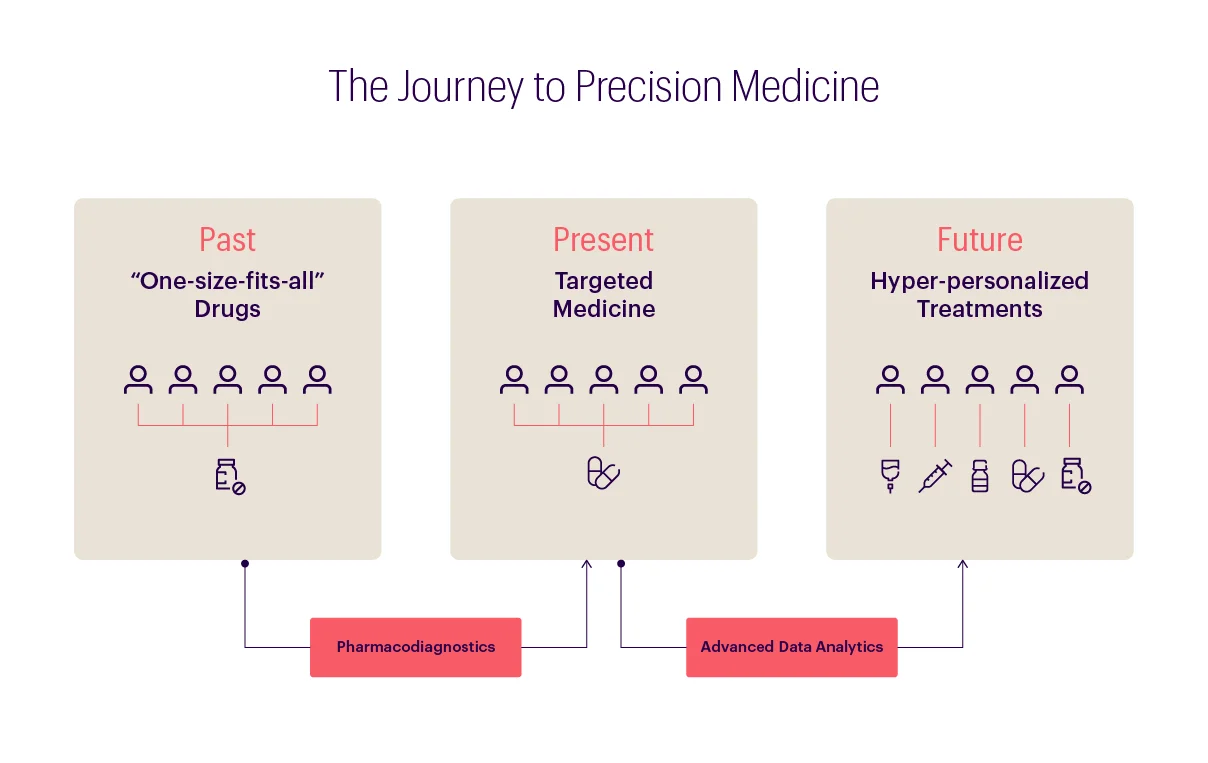The impact of precision medicine on healthcare
The rapid adoption of precision medicine
It is a well-known fact that consumer demand for more personal experiences is reshaping multiple industries, and the healthcare industry is no exception. The pandemic has caused a massive change in consumer health expectations: it has hastened the transition to 24/7 care, highlighted the need for more accurate, accessible, and affordable healthcare, and shown how community-based medical providers can assist with both preventive and chronic care support. [1] [2]
The digitization of high-quality health data, such as diagnostic, treatment, and outcome data from a variety of sources, has helped the healthcare industry evolve in line with changing consumer preferences. Advancements in Machine Learning (ML), Natural Language Processing (NLP), and other analytics tools have been integral to organizing and interpreting the vast amounts of data now available, with genetic and other diagnostic technologies enabling informed choices on optimal and individualized patient care. While precision medicine is not a new concept, we have barely begun to realize its full potential to transform patients’ lives through its multi-faceted approach to disease screening, diagnosis, treatment, and even prevention. A rapid adoption of this approach ensures that the appropriate therapy is prescribed to the correct patient at the right time, boosting the efficiency of healthcare systems worldwide.

Source: healthcaretransformers.com
Pinpointing medical treatment: Emerging impacts of precision medicine
In addition to ensuring better diagnostic speed and accuracy, precision medicine offers the following advantages:
- One of the key benefits of precision medicine is that it allows healthcare providers to create customized treatment programs, taking into consideration the patient’s medical history, genetic makeup, and healthcare goals. These treatments have higher chances of success as they are tailored to the patient’s unique genetic profile, in comparison with existing therapeutic approaches, which are reactive and based on statistical averages.
- The inefficiency of the trial-and-error approach to medical treatments can result in issues such as drug toxicity and severe side effects, besides being potentially harmful to patients. Such treatments can also waste healthcare resources and inflate treatment prices for patients. Precision medicine, through the application of advanced predictive analytics, prevents the need for more severe therapies and involves targeted treatments that reduce the chances of adverse drug reactions, lessen financial burdens, and lead to a better quality of life.
- Precision medicine allows for the use of biomarkers in the early detection of hereditary illnesses and genetic events in disease progression, especially cancer. [1] An analysis of big data from institutions and patient registries for uncommon diseases will help determine which individuals should be referred for genetic screening tests, allowing patients to be diagnosed earlier and treated in a timely manner.
- Precision medicine also enables the identification of patients who are most likely to positively respond to a certain treatment. [2] This saves patients the money and time that they would have spent on ineffective treatments while reducing side effects and increasing chances of success. For pharmaceutical companies, these precision-based patient insights can be used to customize patient support programs to help increase adherence and ultimately improve health outcomes
- Outside of treatment, precision medicine enables targeted drug research and efficient clinical trials by focusing on the individual, and not the average, responses to various experimental drugs. [3] This allows for faster and increased availability of medicines and therapies.
Precision health solutions in use today
- DNA test results can provide personalized reports of genetic data. This helps predict genetic predispositions toward rare diseases.
- Patient monitoring through mobile applications helps them adhere to the prescribed treatment plan as well as track disease progression. [4]
- Tech advancements have made decentralized clinical trials possible, supporting participant diversity and helping speed up the process of drug/vaccine development. [5]
The future vision for precision medicine
Precision medicine has the potential to usher in a new era of healthcare, with the ability to speed up clinical trials, improve outcomes, and fulfill newer patient expectations. In the near future, when a new patient goes to a hospital, their symptoms will be compared across millions of similar patients and matched to a treatment plan that the data indicates has the highest likelihood of success. However, this level of personalization is still a lofty goal at this stage, as we still have various obstacles to overcome, such as the following:
- Utilizing the vast amounts of health information available in an actionable way is of top priority. [6] Healthcare establishments will inevitably rely on advanced data analytics solutions to help accomplish this end. [7]
- Inaccurate genetic analyses or inconclusive interpretations of genetic analysis results can lead to the prescription of incorrect medical care regimens, with repercussions ranging from inadequate treatment to the inducement of new symptoms. Scientists are currently working on enhancing available health analysis technologies before mainstream adoption to ensure that such fatal errors do not occur.
- The excessive cost of implementing precision health solutions is also a cause for concern. Sequencing vast quantities of DNA, for example, is a costly process.
- It is critical that ethical considerations around precision medicine are seriously discussed. There are two sub-issues here: The ramifications of collecting and analyzing massive volumes of patient data. To prevent data leakage and misuse, strong, well-defined ethical laws must be implemented. The next ten years should be distinguished by concerted, proactive efforts to anticipate and address issues like the ones outlined above. Precision medicine has a cost concern as well. Sequencing vast quantities of DNA, for example, is a costly process (although the cost of sequencing is decreasing quickly). Drugs that are tailored to a person’s specific needs are also available. This includes two sub-issues:
- The consequences of collecting and using the vast amounts of health data from patients. Strong, well-defined ethical regulations need to be put in place to safeguard against data leakage and misuse.
- The difficulties in collating and matching large datasets down to the patient level without violating HIPAA and ethical guidelines remain a huge obstacle to the widespread adoption of precision medicine.
- Concerns about personalized medicine’s propensity to worsen healthcare inequality due to existing systematic biases. Precision Health will need to go beyond the genetic makeup to record the socioeconomic background that affects an individual’s health in order to understand and overcome inequities.
Regardless, precision medicine offers numerous advantages in advancing healthcare, from the early detection of health risks to customizing treatment plans to the individual’s needs. As our healthcare technologies continue to develop, it is important to be aware of, reflect upon, and address potential concerns. The next decade should be marked by coordinated, proactive efforts to predict and tackle such difficulties as those mentioned above. As developments in technology support these efforts, health care will be reframed and redesigned, impacting the foreseeable future irreversibly.
Bibliography
[1] Rhee, Kyu. “3 Ways the Pandemic Has Advanced Personalized Health Care.” World Economic Forum, November 5, 2021.
https://www.weforum.org/agenda/2021/11/3-ways-pandemic-advanced-personalized-health-care/
[2] “Health Care Insights Study 2021.” CVS Health, n.d.
https://www.cvshealth.com/news/research-reports/health-care-insights-study/health-care-insights-study-2021.html.
[3] Meco, Antonio Di, and Robert Vassar. “Chapter Eight – Early Detection and Personalized Medicine: Future Strategies against Alzheimer’s Disease.” Progress in Molecular Biology and Translational Science, December 3, 2020.
https://www.sciencedirect.com/science/article/abs/pii/S1877117320301691
[4] Visvikis-Siest, Sophie, Danai Theodoridou, Maria-Spyridoula Kontoe, Satish Kumar, and Michael Marschler. “Milestones in Personalized Medicine: From the Ancient Time to Nowadays-the Provocation of COVID-19.” Frontiers, October 26, 2020.
https://www.frontiersin.org/articles/10.3389/fgene.2020.569175/full
[5] Schork, Nicholas J. “Personalized Medicine: Time for One-Person Trials.” Nature News, April 29, 2015.
https://www.nature.com/articles/520609a
[6] Ventola, C Lee. “Mobile Devices and Apps for Health Care Professionals: Uses and Benefits.” National Library of Medicine, May 2014.
https://www.ncbi.nlm.nih.gov/pmc/articles/PMC4029126/
[7] Bastek, Andrea. “In an Age of Precision Medicine, Decentralized Clinical Trials Are a Valuable Tool.” MedCity News, December 13, 2021.
https://medcitynews.com/2021/12/in-an-age-of-precision-medicine-decentralized-clinical-trials-are-a-valuable-tool/ .,
[8] Brothers, Kyle B, and Mark A Rothstein. “Ethical, Legal and Social Implications of Incorporating Personalized Medicine into Healthcare.” Personalized medicine, November 1, 2015.
https://www.ncbi.nlm.nih.gov/pmc/articles/PMC4296905/
[9] Bohr, Adam, and Kaveh Memarzadeh. “The Rise of Artificial Intelligence in Healthcare Applications.” National Library of Medicine, June 26, 2020.
https://www.ncbi.nlm.nih.gov/pmc/articles/PMC7325854/
